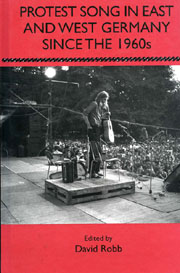Book contents
- Frontmatter
- Contents
- Acknowledgments
- Introduction
- 1 The Reception of Vormärz and 1848 Revolutionary Song in West Germany and the GDR
- 2 Mühsam, Brecht, Eisler, and the Twentieth-Century Revolutionary Heritage
- 3 Narrative Role-Play as Communication Strategy in German Protest Song
- 4 The Burg Waldeck Festivals, 1964–1969
- 5 The Folk and Liedermacher Scene in the Federal Republic in the 1970s and 1980s
- 6 Konstantin Wecker: Political Songs between Anarchy and Humanity
- 7 Wolf Biermann: Die Heimat ist weit
- 8 Political Song in the GDR: The Cat-and-Mouse Game with Censorship and Institutions
- 9 The Demise of Political Song and the New Discourse of Techno in the Berlin Republic
- Works Cited
- Notes on the Editor and Contributors
- Index
Introduction
Published online by Cambridge University Press: 05 February 2013
- Frontmatter
- Contents
- Acknowledgments
- Introduction
- 1 The Reception of Vormärz and 1848 Revolutionary Song in West Germany and the GDR
- 2 Mühsam, Brecht, Eisler, and the Twentieth-Century Revolutionary Heritage
- 3 Narrative Role-Play as Communication Strategy in German Protest Song
- 4 The Burg Waldeck Festivals, 1964–1969
- 5 The Folk and Liedermacher Scene in the Federal Republic in the 1970s and 1980s
- 6 Konstantin Wecker: Political Songs between Anarchy and Humanity
- 7 Wolf Biermann: Die Heimat ist weit
- 8 Political Song in the GDR: The Cat-and-Mouse Game with Censorship and Institutions
- 9 The Demise of Political Song and the New Discourse of Techno in the Berlin Republic
- Works Cited
- Notes on the Editor and Contributors
- Index
Summary
From the 1960s through the 1980s the German political song enjoyed substantial popularity in both the Federal Republic and the German Democratic Republic. In West Germany in the early 1960s the influence of the new American and British folk and protest song movement inspired members of the Jugendbewegung to rediscover a democratic German folk-song tradition that had been stamped out under Nazi jackboots (“Stiefel in den Dreck gestampft”), as Franz Josef Degenhardt expressed it in the song “Die alten Lieder.” This tradition had been documented in Wolfgang Steinitz's two-volume song collection, Deutsche Volkslieder demokratischen Charakters aus sechs Jahrhunderten, which had appeared in the GDR in 1954 and 1962. Steinitz was concerned with the Volkslieder of the “werktätiges Volk” as opposed to “das Volk” of romantic folklore as propagated in the songs of the Nazis. In addition to these rediscovered folk songs, singers such as Degenhardt and Dieter Süverkrüp began writing their own socially critical songs. German folk and protest songs flourished over the next three decades, functioning as an artistic medium for the political protest of the 1968 students movement and the neue soziale Bewegungen of the 1970s and 1980s as well as being a popular commercial commodity for a left-wing intellectual public. In the 1970s and early 1980s acts such as Degenhardt, Wolf Biermann, Hannes Wader, and Konstantin Wecker performed to large audiences that one would normally only associate with rock or pop acts.
- Type
- Chapter
- Information
- Publisher: Boydell & BrewerPrint publication year: 2007



